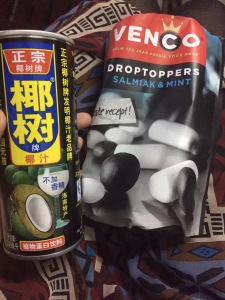If food is such a great means to create cross-cultural cohesion, perhaps the UN should pay more attention to finding ways to solve international conflicts with food.
Vrije Universiteit (VU) Amsterdam held an International Day yesterday; a very successful event.

All countries in which any faculty of the university has partners were advertising themselves on stands.
While the staff of the International Office and those responsible for focus countries like myself (for China, obviously) were present to help students interested in studying abroad with information, the key persons yesterday were the foreign students studying at VU University who volunteered to occupy their country’s stands from noon to 5 pm.
Some of them wore traditional garments, while others had brought musical instruments. Combined with the national flags and posters, all this was good for a colourful event.
If I were to name one single aspect that was shared by all stands it would be: food.
The students had, per country, been given a certain budget with which they could purchase foods and drinks from their country to attract visitors. Fortunately, there are plenty of smaller and larger shops in Amsterdam specialising in national delicacies from all over the world.
This proved a perfect ruse to create traffic to the stands and the event as a whole. Walking over the floor of the event was a genuine eating spree for the students, who, while munching on an unknown delicacy, leafed through brochures to see if they could find something of their liking.
Not only the visiting students, but also the students at the stands regularly visited those of other countries to chat, and . . . to have taste of the other’s cuisine.
Confucius > food > political aspirations
During the 2018 meeting of the Shanghai Cooperation Organization in Qingdao (Shandong, the province that is also the home of Confucius’ birth town Qufu), the Chinese hosts served dishes from the so called Confucian cuisine. That is a fine combination of region marketing and linking traditional Chinese philosophy to China’s modern global aspirations. One of the core concepts of Confucius’ philosophy is ‘harmonious society’, a society in which all kinds of people feel that they have their rightful place. This idea is reflected in an equally important notion in Chinese cuisine: balancing the flavours.

Not only cuisine
Nations not only meet by mixing their cuisines. They can also form interesting combinations of popular manufactured foods; like the Chinese Yeshu coconut drink in this picture matches well with most famous of Dutch candies: drop (liquorice).
Chinese food and culture in a Dutch school cantine
The Hague University of Applied Sciences had a Chinese food theme in its main cantine in June 2016. Yet another way of positively reinforcement mutual understanding through food.

Food tears down borders
This blog includes a great post introducing the way China is using its food industry to create transnational regions, with Xinjiang (Chinese Turkestan) and Kazakhstan as an example. Follow the link to read all about it.
Asian Civilisation Week
Several food festivals were held in Hangzhou, Chengdu and Guangzhou, as part of the Asian Civilisation Week and the Conference on Dialogue of Asian Civilizations held in Beijing, May 2019.

Chinese workers and US soldiers unite over food in Afghanistan

I read about this in a very interesting (and humorous) blog post (Oct 11, 2019) of a Chinese construction worker on assignment in Afghanistan that I posted on LinkedIn. Chinese government-sent construction workers share their food with US soldiers stationed there. The Americans were apparently so fed up (!) with their army grub, that they asked the Chinese if they could eat in their dining room every now and then. The Chinese had no problem with that, under the condition that the Americans would help them with some of their tasks and . . . if they were allowed to practice shooting with the American rifles. Fried rice for bullets; sounds like a great deal and the photo shows that the food was appreciated. A warm human interest story from which Mr Trump could learn a lot.
Food as alternative for politics

This report about a China-Hungary Workshop that was organised by the College of Food Science, Southwest University in Chongqing is a great example of how food is the best topic to forge international and cross-cultural relations. Hungary, as several other central European nations, is caught in the political issues between the EU and the US, the EU and Russia, the EU and China, etc. The participants of this workshop include diplomats, alongside academics, so you can argue that it is not entirely void of politics. Still, the topic of food creates an ambiance in which the participants start by identifying common interests in a specific topic; a great example of people’s diplomacy.
Food in foreign policy
The leading thought in Chinese foreign policy is the Belt and Road Initiative. This policy is founded on future major infrastructure links between East Asia over land and sea to Europe. I have written a separate blog about the way this foreign policy is linked to bilateral agreements about food between China and Kazakhstan.
Peter Peverelli is active in and with China since 1975 and regularly travels to the remotest corners of that vast nation. He is a co-author of a major book introducing the cultural drivers behind China’s economic success.
